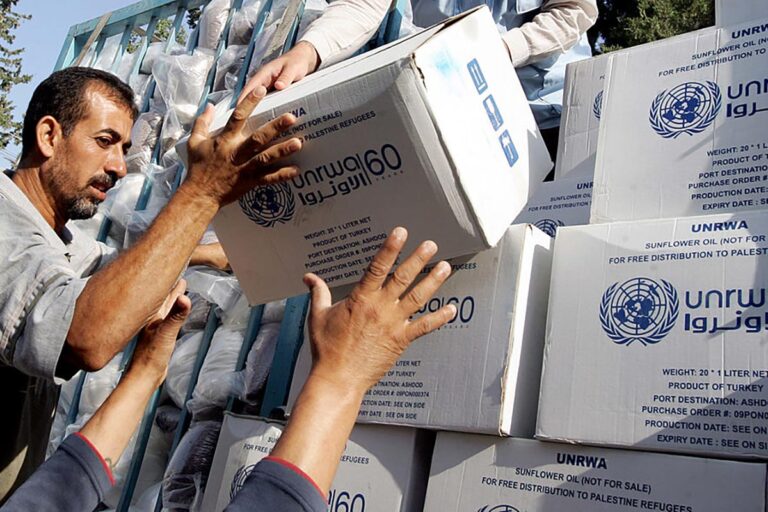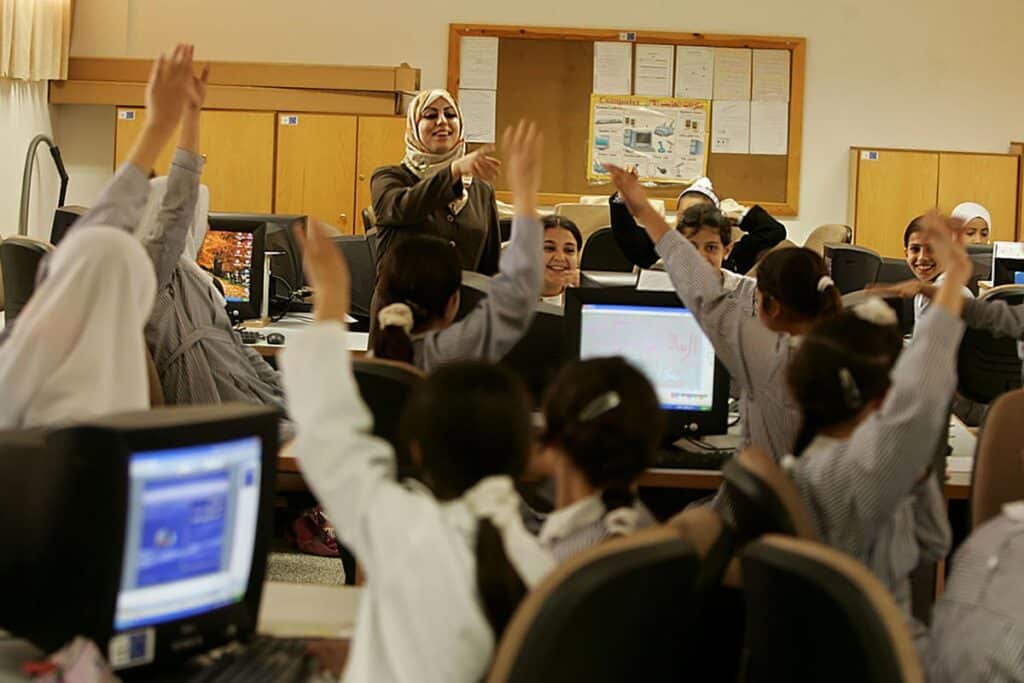
Several countries — the U.S., U.K., Canada, Germany, France, Australia, Italy, the Netherlands, Switzerland, and Finland — suspended their funding of the United Nations Relief and Works Agency for Palestinian Refugees in the Near East (UNRWA) after Israel provided evidence showing that at least 12 of its employees were actively involved in the Oct. 7 Hamas attacks on Israel.
Israel also shared intel with the U.S. that 10% of all UNRWA employees in Gaza have ties to terror organizations, the Wall Street Journal reported.
With Israel’s allegations against UNRWA and the decision by several countries to halt funding in response, let’s unpack the situation. What is UNWRA and what exactly are the allegations against them?
What is UNRWA?
Established in 1948 following Israel’s War of Independence, UNRWA was initially set up to provide humanitarian assistance to Arab Palestinians who were displaced during the war as well as their descendants.
UNRWA is the only organization within the U.N. that is dedicated to one refugee group. Other refugees around the world all fall under the broader UNHCR (United Nations High Commissioner for Refugees).
While UNHCR recognizes refugees themselves as such, it encourages their descendants to integrate into their host countries and does not give them refugee status. By contrast, UNRWA extends refugee status to Palestinian refugees’ descendants as well.
Today, UNRWA workers provide services such as education, health care, social services, and emergency aid to over 5 million Palestinians living in Jordan, Lebanon, Syria, Gaza, the West Bank and East Jerusalem.

The agency’s operations are largely funded by voluntary contributions from U.N. member states, with a small portion of its funds coming from the regular U.N. budget.
UNRWA is one of the largest U.N. agencies with more than 30,000 employees — 13,000 of whom are based in Gaza — and an annual budget of over $1 billion..
Is UNRWA absolving Hamas of its responsibilities?
In Gaza, UNRWA provides crucial services to Palestinians, acting as the “de facto government” and effectively freeing Hamas to focus on its terror activities, according to Palestinian journalist Bassam Tawil.
“By providing the residents of the Gaza Strip with various services, UNRWA exempted Hamas from its responsibilities as the governing body, such as creating a working economy that would pay for education and healthcare, and allowed it, instead, to invest resources in building tunnels and manufacturing weapons,” Tawil wrote.
“If UNRWA were not there, Hamas would have been forced to fill the vacuum and, for example, build hospitals and schools and find solutions to economic hardship, including unemployment and poverty,” he added.
A senior Hamas official, Mousa Aby Marzouk, recently acknowledged this. When asked why Hamas has built 500 kilometers worth of tunnels but not bomb shelters for Palestinians, Marzouk replied:
“The tunnels were built to protect the fighters of Hamas from [Israeli] airstrikes. As you know, 75% of the residents of the Gaza Strip are refugees. It is the responsibility of the United Nations to protect the refugees.”
Hamas Official Mousa Abu Marzouk: The Tunnels in Gaza Were Built to Protect Hamas Fighters, Not Civilians; Protecting Gaza Civilians Is the Responsibility of the U.N. and Israel #Hamas #Gaza pic.twitter.com/LlIVcQX6dt
— MEMRI (@MEMRIReports) October 30, 2023
What are Israel’s allegations about UNRWA?
Last week, Israel shared evidence with the U.N. that at least 12 UNRWA members were actively involved in planning and executing the Oct. 7 attacks.
“Of the 12 UNRWA employees with links to the attacks, seven were primary or secondary school teachers, including two math teachers, two Arabic language teachers and one primary school teacher,” according to the Wall Street Journal.
Israel alleged that the staffers actively participated in the attack and that the agency’s vehicles and facilities were also involved.
In response, UNRWA fired the 12 employees, adding in a statement, “Any UNRWA employee who was involved in acts of terror will be held accountable, including through criminal prosecution.” The agency also condemned the Oct. 7 attacks.
Since the Oct. 7 attacks, there have been persistent rumors about UNRWA’s involvement. These suspicions intensified in December after one of the released Israeli hostages revealed he had been held in an attic for nearly 50 days by a UNRWA teacher. He shared that he was nearly starved and barely received any medical attention while locked away.
"Uninvolved," they say, right? Well, read this story carefully. One of the abductees, held for nearly 50 days in an attic, reveals he was held by a UNRA teacher – a father of ten children. This teacher locked the victim away, barely provided food, and neglected medical needs. But…
— almog boker (@bokeralmog) November 29, 2023
Indoctrination against Jews in UNRWA schools
UNRWA’s alleged ties to terrorism are nothing new. A report last year revealed that over 100 Hamas terrorists graduated from UNRWA schools which foster war-mongering hate against Israel.
“They teach us that the Zionists are our enemy,” one student from Kalandia, a Palestinian village in the West Bank, said. “We should carry out a [terror] operation against them.”
“I hate the Jews,” another student from the same school declared.
Palestinian textbooks produced by UNRWA contain “antisemitic, hateful and violent passages,” according to the Israeli NGO IMPACT-se.
IMPACT-se’s analysis found that the lessons perpetuate harmful antisemitic stereotypes, depicting Jews as inherently treacherous and impure. Their textbooks glorify killing Israelis, teach that dying as a martyr is a “hobby,” and assert that Jews have no rights whatsoever or any legitimate status in Israel.
U.S. President Donald Trump suspended funding to the agency in 2018, and President Joe Biden restored it in 2021.
The international response
The U.S. was the first country to decide to cut funding from UNRWA following the allegations. The U.S. was previously UNRWA’s largest donor, contributing $344 million in 2022.
U.S. Department of State spokesman Matthew Miller said the U.S. was “extremely troubled” by the allegations” and that the country was temporarily pausing additional funding “while we review these allegations and the steps the United Nations is taking to address them.”
U.S. Secretary of State Antony Blinken spoke with U.N. Secretary-General Antonio Guterres on Thursday and emphasized the need for a thorough investigation.
Other countries followed the U.S.’s lead. After pulling funds from UNRWA, Finland’s foreign minister Ville Tavio stated “Finland does not give aid that benefits Hamas.”
The allegations of @UNRWA staff involvement in the 7th Oct terrorist attacks in Israel are extremely concerning. Finland will temporarily pause funding to UNRWA, and will follow the outcome of the independent investigation. Finland does not give aid that benefits Hamas.
— Ville Tavio (@VilleTavio) January 27, 2024
Meanwhile, Israeli Foreign Minister Israel Katz argued that the agency should ultimately be replaced, writing on X, “In Gaza’s rebuilding, @UNRWA must be replaced with agencies dedicated to genuine peace and development.”
A few “bad apples” or a broader issue at UNRWA?
As the fallout from the allegations made international headlines, a debate emerged over whether the 12 employees are exceptions or reflective of a broader problem at the agency.
Chris Gunness, the former director of communications for UNRWA until 2020, told The Guardian that the funding suspension was “collective punishment” for actions committed by only a handful of employees.
“These are 12 very bad apples among 13,000 staff [in Gaza]…The vast majority of the other 13,000 have carried on delivering humanitarian aid under bombardment,” Gunness said before Israeli intelligence revealed that 10% of staff in Gaza have ties to terror groups.
An unnamed senior Israeli government official responded to this, telling the Wall Street Journal, “UNRWA’s problem is not just ‘a few bad apples’ involved in the October 7 massacre. The institution as a whole is a haven for Hamas’ radical ideology.”
Meanwhile, the Jerusalem Post editorial board argued that UNRWA needs substantial reform — particularly with respect to spreading antisemitism and incitement against Israelis in their schools — but that its mission is still necessary.
“Palestinians need aid and recognition, now more than ever; they need what UNRWA is supposed to do, but the agency, both as a microcosm and on a larger scale of ideas, will not solve the Palestinian issue,” the editorial board wrote.
“The hard truth is that any hope for some kind of lasting state of non-war between Israelis and Palestinians rests on many things — one of the most central tenets is education. The narrative approach of Palestinians as antithetical to Israel at their very root, at the heart of their story, is not a long-lasting national directive,” they concluded.
Originally Published Jan 29, 2024 02:58PM EST
